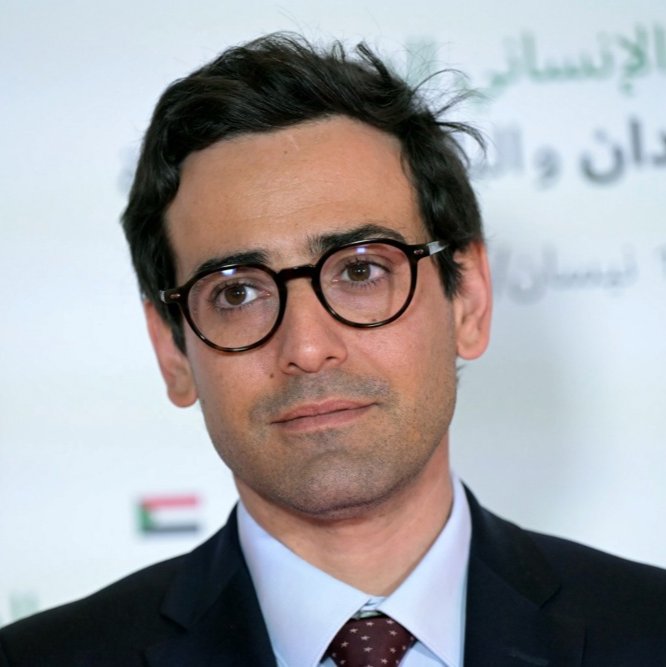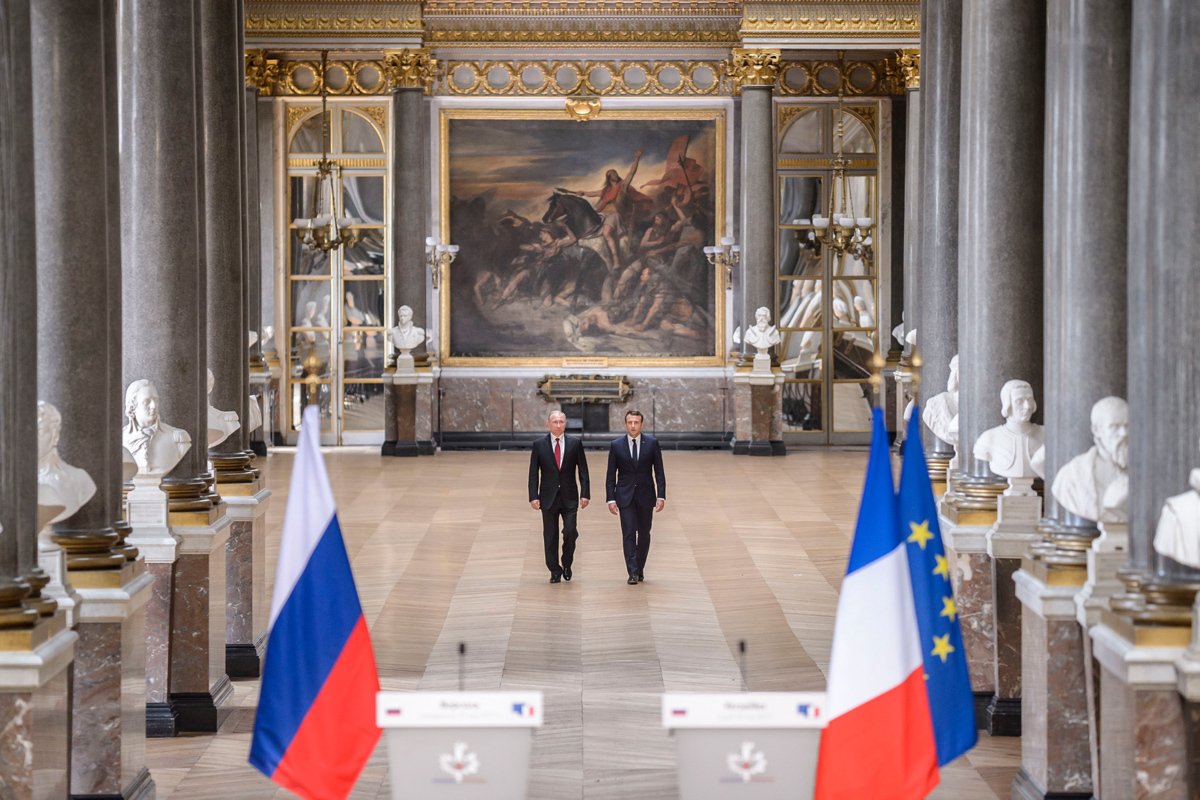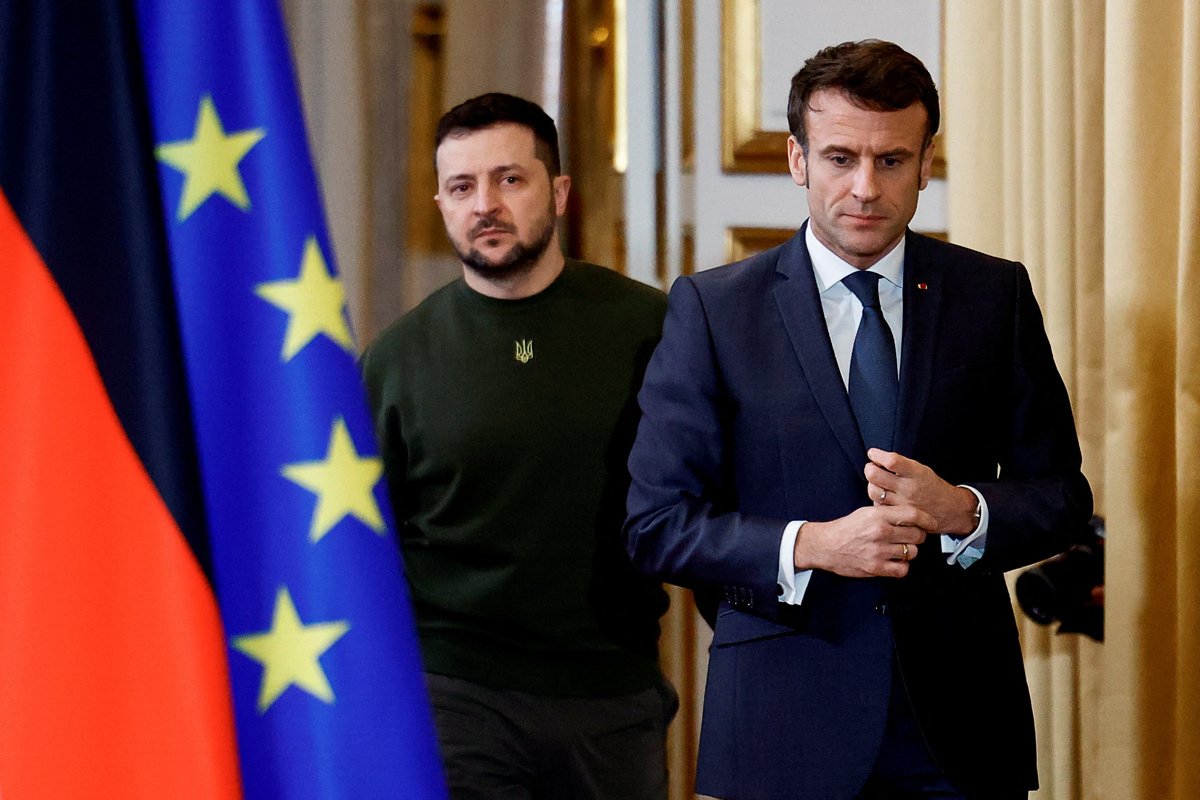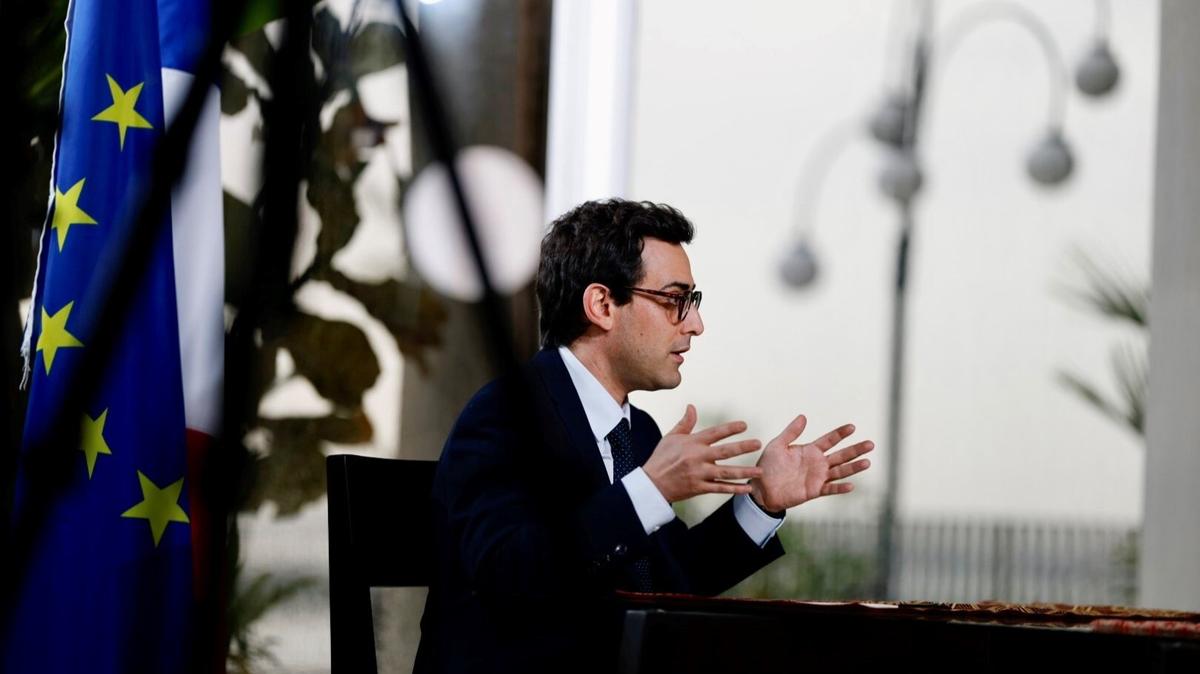To mark World Press Freedom Day, Novaya Gazeta Europe has interviewed Stéphane Séjourné, the French Minister for Europe and Foreign Affairs, about the threats European media freedom is facing, the effect of Russian disinformation campaigns and the chances of anti-war Russians settling in France.

Stéphane Séjourné
French Minister for Europe and Foreign Affairs
NGE: Independent media outlets have been almost completely wiped out in dictatorships like Russia. What, in your view, is currently the greatest threat faced by the European press?
SS: When journalists are threatened, democracy dies. The people of Russia know this more than anyone. The commitment to upholding pluralistic, free, independent information is thus an existential fight for our democratic societies.
And these are not just empty words because the threat is very real. It is on our social media and our TV screens. It is our relationship with the facts which is under threat.
When history is manipulated, when certain media controversies are complete fabrications, when incomplete or false information is indiscriminately mixed with truthful, objective facts, who benefits from this? Autocratic powers.
Our democracies are founded on the free movement of ideas, the exchange of conflicting opinions. But disinformation campaigns and the spread of deep fakes we are currently facing in Europe and around the world are weapons of mass destruction against democracy. If we do not support the independent press, democracy will not recover.
NGE: Russian disinformation campaigns are one of the top issues in the run-up to the elections for the European Parliament. Do you think that Russia is really capable of influencing public opinion in France and other European countries, or is its ability to do so exaggerated? What are we already doing to counter this influence and is it enough?
SS: Unfortunately, it is not just the 2024 European elections where Russia is seeking to deny citizens a precious right: the right to vote freely, under fair debating conditions, for the candidate of their choice. In France, we haven’t forgotten Russia’s interference in the 2017 Presidential campaign. That was already unacceptable.
But we have observed a significant increase in such interference since the start of Russia’s war of aggression against Ukraine. These hostile activities are targeted at France but also at our European partners. I raised this issue publicly alongside my German and Polish counterparts a few weeks ago.
When one country seeks to destabilise another country’s society through its press or social media, this is an extremely serious hostile act.
So we seek to identify it, define what has happened and then publicly condemn it. We did so in February when we exposed the activities of a network of sites, Portal Kombat, which were posting blatantly incorrect and misleading content on the war in Ukraine and the leaders of Ukraine. This alerts our citizens and prevents them from being deceived. We carry out this work via a series of well-coordinated actors, including our agency specialising in online investigations, Viginum. We have the capabilities to detect and to retaliate.
NGE: One hundred years ago, France became the hub for Russian émigrés. Today, does France want to welcome and integrate Russians who are opposed to the war?
SS: You are aware of France’s tradition of welcoming others. It is an honour for our country to welcome people with refugee status, everyone who is under threat in their countries. This is the case for the Russian citizens who have refused to partake in the unjustifiable actions initiated by the Russian leader in February 2022. We also welcome many Russians to France who have chosen to escape from oppression, such as journalists, researchers, artists and students.
It is right that our support for Ukraine, contrary to what Kremlin propaganda reports, is in no way motivated by aggressiveness towards the Russian people.
Our sole objective is to stop the illegal imperialist venture being waged by the Russian leader.
NGE: France is one of the few EU countries where Russians can seek asylum to avoid conscription. Just over a month ago, the French National Court of Asylum (CNDA) for the first time granted asylum to a Russian on these grounds. However, it remains difficult to secure such protection, as that case was first rejected, and protection was only granted following a judicial review. Does France intend to open a further programme or simplify the asylum procedure for Russians who refuse to fight in Ukraine, particularly if another wave of conscription is announced in Russia?
SS: In fact, 19 Russian nationals who proved that they could be mobilised to fight in Ukraine have been granted asylum in France. Naturally, we are monitoring the situation in the countries affected by this asylum procedure.

French President Emmanuel Macron and Russian President Vladimir Putin at a joint press conference at the Palace of Versailles in Paris, 29 May 2017. Photo: Christophe Petit Tesson / EPA
NGE: Until Russia’s full-scale invasion of Ukraine, Moscow and Paris had special relations: forums like the Trianon Dialogue were organised, French leaders regularly visited Russia, and French society showed a certain “Russophilia”, especially when it came to culture and language. Is there now a degree of disillusionment in France vis-à-vis Russians and Russian culture? How do society and the political class see Russians who remain in Russia and who cannot or will not leave?
SS: Our relations with Russia are rooted in history and in the mutual respect between our two peoples. That remains true, even when the Russian government is on a senseless rampage, in violation of all the principles that organise our world, trampling the rule of law and disregarding human life.
NGE: In recent weeks, President Macron’s initiative to send French and/or NATO regular troops to Ukraine has been widely discussed in Europe, Ukraine and Russia. This initiative naturally sparked a sharp response from the Kremlin, but it was also criticised by some of France’s closest EU allies, including Germany. What would it take for France to consider sending its regular forces to Ukraine? Could France act alone, without waiting for consensus among its EU and NATO partners? How would you assess the potential duration and scale of such a mission?
SS: The President of the Republic was very clear during his speech at the Sorbonne last week. Why should the Europeans play transparently with an unpredictable and irresponsible power? Russia needs to understand that when peace in Europe is under threat and when the security of our citizens is at stake, there is no limit and every option is on the table.
And European countries, from the Baltic States to Poland and Finland, are playing a full role in support to Ukraine, including by supporting mine clearance, in cyber cooperation, and by assisting in arms production within Ukraine.
Europe and its partners will remain united and determined for as long as it takes. Russia’s military failure is already a fact.
We estimate that Russia has suffered 500,000 military losses, including 150,000 dead. And for what? Two words suffice: for nothing.

Emmanuel Macron and Ukrainian President Volodymyr Zelensky at a joint press conference at the Élysée Palace in Paris, 8 February 2023. Photo: Sarah Meyssonnier / EPA-EFE
NGE: What is France’s position on the possible use of Russian assets frozen in the EU? How many such assets are there in France, belonging either to the Russian state or to sanctioned Russian individuals? Are there scenarios where France might expropriate these assets and transfer them to Ukraine?
SS: We have frozen Russian assets in the European Union to stop Russia financing its illegal war. France does want to go further: given higher interest rates, these assets generated almost €4 billion in revenues in 2023. We want them to be used to finance defence and reconstruction efforts for Ukraine.
NGE: Research by Novaya Gazeta Europe and other media outlets has shown that, while some French companies left Russia after it launched its invasion, others, including Auchan and its probable sister companies Leroy Merlin and Decathlon have remained there. Moreover, the profits of many of the companies that remain have increased considerably, with Total standing out in particular. In your view, why did these companies decide to remain in Russia? Is the French government taking steps to convince them to leave? Could that happen, and in what time-frame?
SS: France is a free country and French companies are therefore free to choose where they operate and where they invest abroad, so long as they comply with the applicable sanctions regime.
In truth, it has to be admitted that many French companies present in Russia chose to leave after the start of the invasion of Ukraine. The Kremlin’s increasingly aggressive attitude with regard to France is no doubt a major factor. And it is no doubt increasingly difficult for companies to be associated with a regime that is making itself such a pariah on the international stage, a regime that is condemned by almost all countries worldwide. To regain its place in the concert of nations, Russia must make other choices.
Novaya Gazeta Europe opened a Paris bureau in early 2024 with the support of Reporters Without Borders (RSF).
Arnold Khachaturov
Join us in rebuilding Novaya Gazeta Europe
The Russian government has banned independent media. We were forced to leave our country in order to keep doing our job, telling our readers about what is going on Russia, Ukraine and Europe.
We will continue fighting against warfare and dictatorship. We believe that freedom of speech is the most efficient antidote against tyranny. Support us financially to help us fight for peace and freedom.
By clicking the Support button, you agree to the processing of your personal data.
To cancel a regular donation, please write to [email protected]

